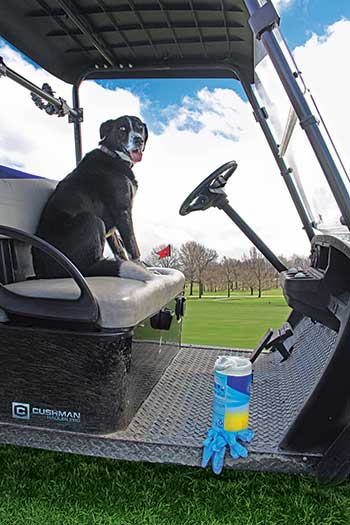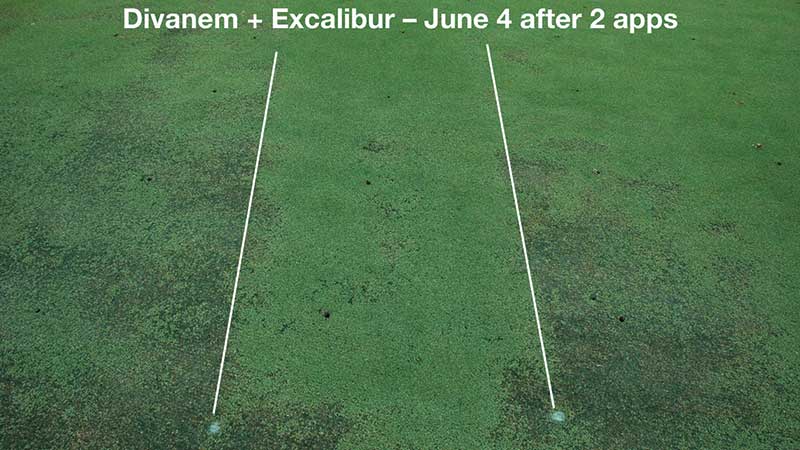Golf in the time of COVID-19

Many golf courses around the country are careful to sanitize equipment and golf carts and provide employees with personal protective equipment such as gloves. Here, Wolf Creek Superintendent Bill Irving’s dog, Frazier, looks on during these uncertain times. (Photo: Golfdom Staff)
It’s an interesting experience to be a superintendent in the time of COVID-19, also known as the coronavirus. There’s no denying the implications this virus has had for golf tournaments around the globe. Superintendents in the U.S. are doing the best they can in a situation changing by the day.
Whether it’s holding morning meetings with a crew spread out 6 feet apart, changing staffing levels to ensure the course is maintained, modifying putting greens so they’re essentially hands free, or even preparing for a total course shutdown, superintendents are reacting as quickly as possible to keep crews and golfers safe.
These interviews display what it was like to be a superintendent as of press time in mid-March. For the most up-to-date coverage, click here.
Jacob Close
Superintendent, Sudden Valley GC
Bellingham, Wash.
“Things are … different,” says Jacob Close, superintendent at Sudden Valley GC in Bellingham, Wash.
Close has an insider’s perspective on the efforts to control the coronavirus in the Pacific Northwest. His wife, Natasha, is on the front lines, studying the coronavirus as an epidemiologist with the Washington State Department of Health.
Armed with her knowledge, Close is doing everything to keep his crew as far from each other as possible and everything in the shop as clean as possible. It’s a waiting game to see how state officials will react, but in the meantime, Sudden Valley is finishing some irrigation work, and Close is planning for wall-to-wall plant growth regulator and fungicide applications in case the course shuts down for several weeks.
“Our commitment is to keep our people working, but there’s just a 50/50 chance we’ll be able to keep them employed over the summer,” Close says. “Tournaments have been a big hit for us, losing 90 percent of (our) bookings through May. If that continues to happen, you could see budgets negatively affected for several years.”
Steve Link
Superintendent, Skagit G&CC
Burlington, Wash.
“Things change every day according to national news and state news — it’s all pretty unknown right now, and everyone’s on edge,” says Steve Link, superintendent at Skagit G&CC, north of the Seattle area, where the first outbreak in the United States was reported.

Morning meetings at Aldarra GC are held with staff practicing “social distancing,” with the exception if two workers live together. (Photo: Sean Reehoorn)
“If we do have to close, I’m pretty sure people would just come onto the course, but we haven’t discussed the possibility of closing yet … my gut feeling is that it won’t affect golf much at all,” he notes.
Start times for Link’s seven-person crew have been staggered by 10-15 minutes. They use a whiteboard for the day’s jobs and communicate via text to maintain social distance. Aside from removing flags and bunker rakes and covering cups, everything gets a bath in bleach and water solution — keys, steering wheels and gates.
In the event that he’ll have to cut some staff, the club’s members have offered to pay up to two weeks for any hours missed.
Kyle Barton
Superintendent, Naperville (Ill.) CC
For Naperville CC, the main concern is limiting employees’ exposure to the virus, according to superintendent Kyle Barton.
The precautionary measures in place at the club include disinfecting all door handles and surfaces multiple times daily, assigning each person a specific cart, wearing gloves while working, staggering lunchtimes to keep 6 feet of distance between employees, wiping down steering wheels after use, washing hands often, wiping down tools with disinfectant after use, staying home if sick and not allowing outside vendors in until further notice.
“We’re only a staff of five right now, so if we can keep (contact) to a staff of five and their families who they’re coming into contact with, then we’re just limiting exposure,” Barton says. “We can’t really help whether they shut down the clubhouse or golf course or not, but we want to be able to keep working on the golf course so that when this whole thing is over, (golfers) have a good playing surface to come back to.”
Blake Cain
Superintendent, Bent Tree CC
Dallas
Bent Tree CC has seen an uptick in rounds played, according to Grounds and Greens Superintendent Blake Cain.
“I think people are looking at the golf course as a place to retreat to in this difficult time,” Cain says, “so we want to make things as enjoyable and safe as possible.”

Superintendents have devised different ways to make the greens “hands free.” (Photo: Golfdom Staff)
Bent Tree has removed bunker rakes; inserted a pool noodle in the bottom of the cup so the ball doesn’t fall to the bottom, making it easier for golfers to remove; limited areas where staff interacts with maintenance facilities; conducted job assignment meetings outdoors in the main parking lot to keep people separated; isolated employees’ lunch breaks; required employees to wear gloves; and sanitized common areas. The club also reached out to employees in the susceptible age range (60 years old and older), asking them to stay safe and remain at home. They will be paid while on leave.
“All of those employees were very happy with that consideration and took us up on that offer,” Cain says. “We just want to provide a safe work environment for everyone.”
Sean Reehoorn
Superintendent, Aldarra GC
Sammamish, Wash.
“I refuse to use the word normal,” says Sean Reehoorn, superintendent of Aldarra GC. “We’re really strict on the social distancing,” he adds, noting that his crew does solo work, with the exception of the two employees who live together. In morning meetings, employees stay 6 feet apart. Reehoorn says social distancing is going to make him a better manager of his crew, noting, “I’m going to be more hands off.”
He says he has to trust his employees will do the job they’re asked to do, instead of him “standing right next to them saying, ‘This is exactly how you need to do this.’”
He’s encouraging his team to practice both gratitude and appreciation, as he says this “gives us an opportunity to be present in our lives.”
“We’ve spent our whole career putting the golf course first,” he says. “We encourage the staff to try to focus on their family; that’s far more important than being here.”
Corey Barnes
Superintendent, Chambersburg (Penn.) CC
With two new employees this year, Corey Barnes, superintendent at Chambersburg CC, had to get creative on how to manage his crew. He split his crew up, so each team had experienced equipment operators.
“I had to take my best guys and split them up, so we have operators on both crews,” he says. “If somebody got sick, at least I’d have enough staff to maintain the golf course to a reasonable standard.”
With employees working six-hour days, Monday through Friday, every other week, the club has encouraged the maintenance staff to apply for unemployment due to reduction of hours. Barnes says he and his crew are going to do the best they can to keep the course in a playable shape.
“We can’t get it all done with a halfcrew. But we’re going to maintain it to a reasonable standard,” he says.
Bob Farren
Director of Golf Course Maintenance, Pinehurst (N.C.) Resort
Bob Farren, Pinehurst Resort’s director of golf course maintenance, likens the situation surrounding the outbreak to Sept. 11.
“You’re concerned, and you want to know what’s going on, but no one knows,” Farren says. “We’re doing what we can to maintain as much normalcy as we can.”
The club has also developed a task force comprised of a small group of division heads to share information and stay on top of the situation, which Farren says is “changing and fluid from one hour to the next.”
Looking ahead, Farren believes that Pinehurst will emerge from the outbreak without taking a major hit.
“I don’t see us recovering back to the levels that we anticipated for this year, but I think at the end of the year, providing things settle out in the next eight or 10 weeks, we’ll be fine,” he says. “It’s going to be a study in humanity … to see what people did and why they did things.”
Rhett Evans
CEO, GCSAA
Lawrence, Kan.
When Golfdom caught up with GCSAA CEO Rhett Evans, the topic, naturally, was how the GCSAA and the industry moves forward during the constantly changing COVID-19 pandemic.
“We’re working to get language out there that will allow us to keep maintenance facilities up and running despite the state mandates,” Evans says. “Golf maintenance is a very unique industry. It’s a specialty crop. You have to water it, you have to take care of it. We’re not asking that golf courses stay open for play.”
Evans says he believes golf is unique in that it is safe to play during the pandemic.
“You can play golf in a safe way. You can be separated over 150 acres,” he says. “But every time I turn around, something changes. What’s coming from Washington is being written at a lightning-fast pace, and we’re going through it trying to make sure golf is not left out,” Evans says. “We’re being vigilant about that. The health of people, the supplies we need, that’s obviously first. We’re further down the line. But we want to make sure golf is treated fairly.”










